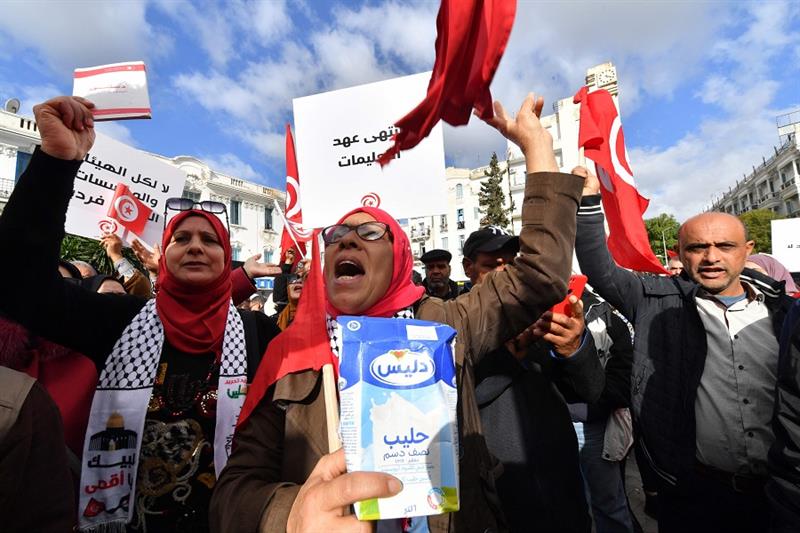
Tunisian demonstrators raise national flags and placards as they take to the streets of the capital Tunis, on January 14, 2023, to protest against their president. AFP
"The people want what you don't want. Down with Saied," chanted the activists, including supporters of the Islamist-inspired Ennahdha party.
Ennahdha had dominated parliament until Saied launched a dramatic power grab on July 25, 2021, sacking the government and freezing parliament before appointing a new cabinet and ruling by decree.
The military takeover "has brought us famine and poverty. Yesterday the grocer gave me just one kilo of macaroni and a can of milk," said Nouha, a woman at one protest.
"How can I feed my family of 13 people with that?" the 50-year-old housewife lamented.
Saturday's protests were staged in the capital Tunis by two different opposition groups and were held far apart with a heavy police presence to avoid any unrest.
They were held against a backdrop of deepening political divisions on the 12th anniversary of the fall of dictator Zine El Abidine Ben Ali.
The biggest opposition force, the National Salvation Front (FSN) which includes Ennahdha, was kept about one kilometer from left-wing party activists gathered in front of the municipal theatre.
The Interior Ministry called on all groups authorized to organize demonstrations to respect the preset itinerary and timing and ensure that there's no violence, urging protesters to respect restrictions and not to provoke clashes with security forces.
Another march attended by hundreds of people was led by Abir Moussi of the anti-Islamist opposition Free Destourian Party, in the south of Carthage, where the presidential palace is located.
Tunisians who largely supported Saied's takeover have become increasingly fed up with the economic crisis.
The state, which is heavily in debt, has found it difficult to import basic goods, and there are chronic shortages of staples such as coffee, milk and sugar.
Saied, who was elected in 2019, has curbed the independence of the judiciary and weakened parliament's powers.
In a referendum in July last year, Tunisian voters approved a constitution that hands broad executive powers to the president. Saied, who spearheaded the project and wrote the text himself, made full use of the mandate in September, changing the electoral law to diminish the role of political parties.
In an apparent response to criticism, Saied on Friday paid a surprise visit to the Bourguiba avenue and went through the capital's historic district, the medina. He called for caution against "intruders and renegades'' who could mix with protesters to provoke clashes.
The Jan. 14 anniversary has been abolished as an official commemoration date by Saied, who instead declared Dec. 17 as the "revolution day.''
Tunisia's uprising began on Dec. 17, 2010, when a desperate fruit vendor set himself on fire, unleashing pent-up anger and frustration among his compatriots, who staged protests that spread nationwide and led to the revolution.
Short link: